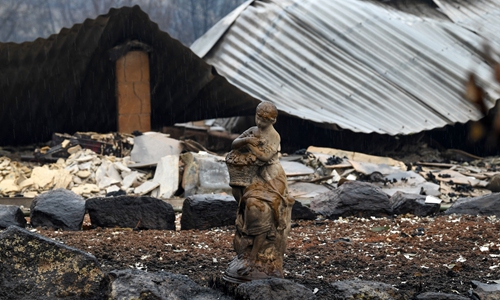HOME >> WORLD
Fire-hit Australia gets $1.4b recovery fund as troops deployed
Source:AFP Published: 2020/1/6 20:38:41

A statue at a burnt house is seen after an overnight bushfire in Quaama in Australia's New South Wales state on Monday. Photo: AFP
Reserve troops fanned out across fire-ravaged regions in three Australian states on Monday after a horror weekend, as the government pledged $1.4 billion over two years to help recover from the devastating months-long crisis.Catastrophic bushfires have turned swathes of land into smouldering, blackened hellscapes and destroyed an area about the size of the island of Ireland, according to official figures, with authorities warning the disaster still has weeks or months to run.
Prime Minister Scott Morrison, whose government has been criticized for its slow response to the emergency, pledged A$2 billion ($1.4 billion) of taxpayer money for a national recovery fund.
"It's a long road ahead and we will be with these communities every step of the way as they rebuild," Morrison said.
Firefighters joined by fresh teams from the US and Canada were taking advantage of rainy and cooler conditions to tackle out-of-control blazes ahead of rising temperatures forecast later this week.
In the biggest-ever call-up of reserves, military teams were deployed across eastern Australia to help emergency services assess the damage, restore power and deliver supplies of food, water and fuel to cutoff communities.
For the first time in Australian history the government also deployed its medical assistance team - normally sent to other nations to lend support in the aftermath of their disasters - to help evacuees.
Almost 5 million hectares have been razed across New South Wales and more than 1.2 million hectares in Victoria since late September, officials said.
That took the total amount of land burnt close to 8 million hectares - around the size of the island of Ireland or South Carolina.
Twenty-four people have lost their lives so far, with over 1,800 homes damaged.
Two people are missing in New South Wales, the nation's most populous state.
The impact of the bushfires has spread beyond affected communities, with heavy smoke engulfing the country's second-largest city Melbourne and the national capital Canberra.
Some government departments were shut in Canberra as the city's air quality was once again ranked the world's poorest, according to independent online air-quality index monitor Air Visual.
Posted in: ASIA-PACIFIC,WORLD FOCUS